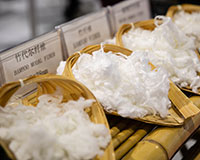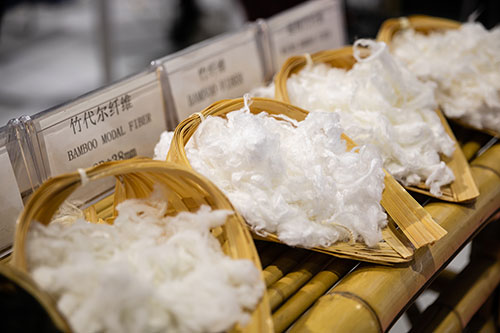FW
"Women power is gaining prominence in 2019 as many female sportspersons are setting records in some of the world’s historically male sports. This was particularly evident when Cori ‘Coco’ Gauff become the youngest player to qualify for Wimbledon and the USA’s women’s soccer team won their second consecutive FIFA World Cup title. Also, more women now occupy high level positions like head coaches and even as owners of male dominated sports teams."
 Women power is gaining prominence in 2019 as many female sportspersons are setting records in some of the world’s historically male sports. This was particularly evident when Cori ‘Coco’ Gauff become the youngest player to qualify for Wimbledon and the USA’s women’s soccer team won their second consecutive FIFA World Cup title. Also, more women now occupy high level positions like head coaches and even as owners of male dominated sports teams.
Women power is gaining prominence in 2019 as many female sportspersons are setting records in some of the world’s historically male sports. This was particularly evident when Cori ‘Coco’ Gauff become the youngest player to qualify for Wimbledon and the USA’s women’s soccer team won their second consecutive FIFA World Cup title. Also, more women now occupy high level positions like head coaches and even as owners of male dominated sports teams.
This growth in female sportspersons is being tapped not just by activewear but also other fashion brands. Edited’s retail data platform analysed the new offerings launched by brands for two of the most prominent US female team sports.
The data tracked over 500 new soccer related products. It noted that the vast majority of products stocked by these brands included T-shirts and jerseys. The top two stockists included Fanatics and Dick’s Sporting Goods, which stocked 255 and 129 products respectively. Retailers like Walmart and Macy’s are also breaking into the top five list with their product offerings too. This trend suggests that there’s demand for this product and retailers are capitalising on it. This is encouraging retailers to stock more sports-related assortments, and align their drops around particular sporting events.
these brands included T-shirts and jerseys. The top two stockists included Fanatics and Dick’s Sporting Goods, which stocked 255 and 129 products respectively. Retailers like Walmart and Macy’s are also breaking into the top five list with their product offerings too. This trend suggests that there’s demand for this product and retailers are capitalising on it. This is encouraging retailers to stock more sports-related assortments, and align their drops around particular sporting events.
WNBA increases stock of women sports apparels
Founded in 1996, the WNBA recently increased its stock of women sports apparels by 261 per cent YoY. The league procured its apparels from not just existing goods retailers but also first time investors. Its pricing structure for buying these apparels has also changed with the price of its cheapest garment decreasing from $22.00 last year to $7.99 this year. However, price of its most expensive garment has increased from $75.00 to $139.99. The average full price commanded by the brand has risen dramatically, while its number of products discounted has declined.
Growing market influences brands to launch new styles
The sportsworld has not just influenced the runway but has successfully translated well into the mass market. For example, many brands launched new sports jerseys as a part of their Spring ’20 collection. They also introduced new athleisure styles. For instance, Nike, which earlier stocked only $35.00 Dri-Fit t-shirts, now offers premium $100.00 WNBA jerseys.
The growing popularity of sports apparels makes it necessary for brands to launch innovation trends in this sector. Edited helps these brands to achieve this goal besides helping them to monitor new upcoming market trends.
"With most brands today swearing by their sustainability initiatives, it has become difficult for retailers to distinguish between genuine and fake adopters. Therefore, retailers are now planning to acquire sustainability certificates that help them establish and enforce their environmental quality standards. These certificates enable brands to apply a seal of approval on their products and its packaging acts as social proof and validation for their efforts."
 With most brands today swearing by their sustainability initiatives, it has become difficult for retailers to distinguish between genuine and fake adopters. Therefore, retailers are now planning to acquire sustainability certificates that help them establish and enforce their environmental quality standards. These certificates enable brands to apply a seal of approval on their products and its packaging acts as social proof and validation for their efforts.
With most brands today swearing by their sustainability initiatives, it has become difficult for retailers to distinguish between genuine and fake adopters. Therefore, retailers are now planning to acquire sustainability certificates that help them establish and enforce their environmental quality standards. These certificates enable brands to apply a seal of approval on their products and its packaging acts as social proof and validation for their efforts.
A recent research by PEFC shows over 80 per cent consumers prefer to shop from brands that use labels on their products to communicate about their responsible sourcing practices. Similarly, 54 per cent consider these certificates to be the strongest proof of their environmental and sustainable practices.
Certificates add a competitive edge, communicate brand value
Another research firm HBR also notes this approach of integrating certificates within their brand messages and on product labels is a powerful way to influence consumers purchasing behavior. These certificates give a competitive edge to brands that have made sustainability inherent to their operations. They not only communicate the brand’s value but also make consumers’ purchasing decisions easier. This is the reason why more retail brands are planning to apply for such certifications in future. A case in point is Fashion brand Faherty, which recently applied for the Bluesign certification. This certificate focuses on improvements around the manufacturing process of consumer textiles. It ensures consumer safety, low-impact product manufacturing, and the responsible use of resources.
on product labels is a powerful way to influence consumers purchasing behavior. These certificates give a competitive edge to brands that have made sustainability inherent to their operations. They not only communicate the brand’s value but also make consumers’ purchasing decisions easier. This is the reason why more retail brands are planning to apply for such certifications in future. A case in point is Fashion brand Faherty, which recently applied for the Bluesign certification. This certificate focuses on improvements around the manufacturing process of consumer textiles. It ensures consumer safety, low-impact product manufacturing, and the responsible use of resources.
Besides Faherty, European clothing brand Frances Austen is adopting the certification route. The brand’s cashmere yarn is spun by Italian cashmere producer Carriagi, which is Oeko-Tex Standard 100certified. It has also obtained the ISO 14001 Certification, which monitors its consumption of water, energy, paper, and plastic besides ensuring the presence of sustainable, environmentally-friendly standards.
These sustainability certificates add a layer of easy-to-grasp social proof for the brand’s consumers. However, consumers first need to be aware about the requirements of these certificates for which they need to ask approximate questions that hold the responsible holding these certificates truly responsible for the implied standards.
Fespa was held in Mexico from August 22 to 24, 2019.
This digital and textile printing exhibition showcased the latest innovations and technologies of the printing industry in Latin America. It received more than 11,000 visitors. Exhibitors presented the latest product innovation for large format digital printing, screen printing, textile printing, sublimation, signage, garment decoration, finishing equipment and 3D printing. They used this exhibition as a platform to showcase their machinery, supplies and services and met and networked with customers from different sectors of the industry. Visitors came from the United States, Colombia, Guatemala, Costa Rica, Panama, Argentina, Brazil, Germany, Spain and Taiwan. Digital printing was one of the many interest areas for visitors, and 40 per cent came with the mission of buying machinery with new technology, while 30 per cent sought to discover new products. Fespa is a window for the Mexican market, where they can discover a portfolio of solutions. There is everything to support them in developing their business, including cost analysis, productivity and print quality. A series of events, conferences and workshops were featured by experts from the graphics industry. Print Make Wear allowed visitors to see the process of making a garment, from design to labeling and packaging.
Fespa is the global federation of specialised print, education and training. Every year the show continues to grow.
The Directorate of Revenue Intelligence (DRI) has directed the customs to carefully scrutinise the origin of certificates issued for garments imported from other countries through Bangladesh. Garments that are being imported through Bangladesh from other countries take advantage of duty concessions offered under the free-trade pact.
There was concern over growing cheap imports from third countries through Bangladesh and that the agency wanted to ensure that imports from only Bangladesh were brought in. In August, the agency issued a show-cause notice on 83 garment consignments that were allegedly imported from third countries and routed through Bangladesh to avail of zero import duty. Also, the DRI fears that other importers would abuse the route and hence wants the customs to stay alert.
The customs department is also watching over garment imports entering the country through Bangladesh under the South Asian Free Trade Area agreement.
For import by other countries, a 30 per cent local value addition is mandated by the South Asia Free Trade Agreement in least developed nations. These local value addition rules are included in the trade pacts to ensure contribution to the exporting partner’s economy and local job creation through a criterion of very strict value addition, as well as to protect the importing partner.
China, once dubbed as the world’s sweatshop, is now an influential fashion trendsetter.
Chinese designers want to break the stereotype that clothes from China are poor in quality and lacking in originality. They want the world to realise that they can be very creative and really know how to make high-quality production. So for instance they use such basic colors as grey, white and black as well as power tailoring to create elegant and confident looks for career women. Another stereotype is the necessity to incorporate symbols like the dragon, panda and the color red into Chinese designs. Chinese designers are instead focusing more on promoting universal values and expressing their own attitudes rather than selling Chinese culture.
The influence of Chinese fashion has fast expanded, reaching larger audiences around the globe as home-grown designers, spending power and fashion aesthetics keep growing. Apart from designer brands, Chinese fabric manufacturers and garment suppliers have also become more influential internationally. Last year China exported 36 per cent of the world’s exports of textile and apparel. The country is proactively moving toward automation and smart production through technological innovation and nurturing indigenous brands to move up the value chain. The rising fashion industry is an epitome of China’s fast development over the past few decades.
Burberry has been included in the Dow Jones Sustainability Index (DJSI) for the fifth consecutive year.
Sustainability metric DJSI evaluates a company’s economic, environmental and social impact and is a trusted benchmark for investors who integrate sustainability considerations into their decision-making and investments.
Burberry has a longstanding commitment to sustainability, with social and environmental programs in place for more than 15 years. During 2018-’19, Burberry reduced its market-based emissions by 43 per cent and procured 58 per cent of its total energy including 68 per cent of its electricity from renewable sources. Burberry aims at being 100 per cent carbon neutral by 2022.
Driving a more circular economy for fashion is central to Burberry’s sustainability agenda and as part of this Burberry continues to expand ways to reuse, repair, donate and recycle products and materials. Burberry is working at eliminating problematic or unnecessary plastic packaging. This includes ensuring plastic in packaging can be easily reused, recycled or composted and circulating any plastic packaging so that it can be made into new packaging or products. Recently, Burberry launched new sustainable packaging made from recycled coffee cups, with the resulting product fully recyclable. Burberry is also committed to supporting the people and communities that sustain the luxury industry through youth inspiration, community cohesion and social and economic empowerment programs.
"To be held from September 25-27, 2019, Yarn Expo Autumn 2019 will offer yarn and fiber solutions for every sourcing need – with eco-friendly, functional and fashionable options and a new display area for fancy yarn. To be held over 26,000 sq m at the National Exhibition and Convention Center in Shanghai, the exhibition will feature 542 suppliers from 14 countries and regions. These include new exhibitors from Lithuania, Nepal and Taiwan."
 To be held from September 25-27, 2019, Yarn Expo Autumn 2019 will offer yarn and fiber solutions for every sourcing need – with eco-friendly, functional and fashionable options and a new display area for fancy yarn. To be held over 26,000 sq m at the National Exhibition and Convention Center in Shanghai, the exhibition will feature 542 suppliers from 14 countries and regions. These include new exhibitors from Lithuania, Nepal and Taiwan.
To be held from September 25-27, 2019, Yarn Expo Autumn 2019 will offer yarn and fiber solutions for every sourcing need – with eco-friendly, functional and fashionable options and a new display area for fancy yarn. To be held over 26,000 sq m at the National Exhibition and Convention Center in Shanghai, the exhibition will feature 542 suppliers from 14 countries and regions. These include new exhibitors from Lithuania, Nepal and Taiwan.
To be organised by Messe Frankfurt (HK) and the Sub-Council of Textile Industry, CCPIT, Yarn Expo Autumn 2019 will be held concurrently with the 25th Autumn Edition of Intertextile Shanghai Apparel Fabrics, as well as CHIC and PH Value.
The Overseas Yarn Zone
Yarn Expo Autumn has shown reliable growth and expansion over the years, making it an important industry event and a popular choice for leading global suppliers to unveil their latest collections and innovations.
event and a popular choice for leading global suppliers to unveil their latest collections and innovations.
The Overseas Yarn Zone at the expo will house 132 suppliers from countries and regions including Hong Kong, India, Indonesia, Korea, Lithuania, Nepal, Pakistan, Singapore, Taiwan, Turkey, the US, Uzbekistan and Vietnam. This zone will include:
India Pavilion: The India Pavilion features 55 exhibitors with a huge variety of products including cotton, fancy synthetic yarn, Lysell linen, Modal linen, Tencel, viscose, polyester and more. Highlighted companies include GTN Patspin Group of Companies, Lahoti Overseas, Premier Cotton Textiles and RSWM.
Pakistan Zone: The Pakistan Zone will feature 15 leading suppliers including Abtex International, who will showcase their new hybrid colour mixing yarns and fancy yarns; Fabcot International with cotton yarns and greige and Hussain Mills who will offer organic cotton.
Birla Satellite: This zone will house 15 exhibitors including Birla Cellulose which will showcase its environmentally-friendly regenerated cellulose fibers. The company is known worldwide for soft and eco-friendly viscose fibers, including Birla Viscose, Birla Modal, Birla Spunshades and Birla Excel.
Other highlighted exhibitors from different countries & regions include:
• Naturalus Pluostas (Lithuania)
• Reliance Spinning Mills (Nepal)
• Everest Textile (Taiwan)
• Tung Ho Textile (Taiwan)
Fashionable and functional yarns from domestic suppliers
Suppliers will also display fashion-forward and functional yarns to ensure that their end pieces stand out from the crowd. Some of these fashionable products include fancy yarn, quality wool yarn and eco-friendly linen. These will be displayed by leading Chinese exhibitors including Hongqi, Lida, Zhongxin Resources, Lugang, Haoye and Dalang Wool Yarns. These domestic suppliers will be categorised into product zones, making it easier for visitors to navigate the comprehensive product range in the hall.
• Fancy & Specialty Yarn Zone: The size of this zone has increased by 30 per cent, while number of exhibitors has increased to 140. In this edition, the zone will launch Fancy Yarn Vision (booth A02) - a display area featuring creative fancy yarns and application products from exhibitors.
• Functional Chemical Fiber Zone: This zone displays the trends of Chinese fiber fashion alongwith themed displays of multi-functional and eco-friendly products and an Industry Alliance Zone.
• Natural Cotton Yarn Zone: This zone will feature over 100 high-quality cotton spinners, including Kang Pinna, Litai, Peixian Cluster, Gyeonggi, Wuxi Yimian, Anhui Huamao, etc.
The uncertainty over a no-deal Brexit is making things difficult for the UK fashion business. From designers to models and garment-makers are keen to know the impact leaving the European Union will have on their industry.
Benefits from overseas trade deals outside the EU with countries like Australia, the US and Canada would take time to have effect. Exchange rates are causing difficulties because of how fashion companies work. It’s common for brands to forward sell. Essentially, they agree to sell clothes at a certain price a few months in advance. But it’s hard to know how to price things because of the changing value of the pound. The clothes showcased at a fashion week this month will be on sale to customers in February next year, so placing orders on those goods is a total gamble with fluctuating rates.
But Brexit could push more clothing factories to open in the UK. Leaving the EU could lead Britain to offer more competitive prices. There may be growth within garment manufacturing and more garment manufacturers may arise. However when it comes to the high street, costs could go up because of taxes on imports and exports. Imports involve delays and transport issues, logistics and tariffs. So prices can go up.
The circular economy is helping brands hit their environmental and economic targets and succeed in today’s marketplace.Outdoor clothing brand FW’s new range of clothes has been designed to help put an end to throwaway consumerism, emphasizing durable, high-quality construction and materials to ensure the garments last and last. By repairing every garment it can, FW is selling clothes that could be worn for life. This is an important move away from the usual practice of simply disposing of clothes when they become damaged. Through a dedicated service designed to make clothes last longer, customers will have the option of having garments repaired for free within a warranty period. Repairs will still be available to customers at a low cost beyond the warranty period.
A repair service is one of several models companies may integrate into their business to create more value and profit, while reducing their environmental impact. Repairing products helps to keep them in use for longer and builds loyalty with the customer. Several market players across the fashion sector illustrate the competitive advantage of circular business models, which can help build not just a more sustainable business but customer loyalty too. People are waking up to the impacts of their shopping habits and increasingly demanding more sustainable options from brands.
Brands are diversifying their offer to provide not only fashion, but an entire experience. They are looking to generate experience in its clients a 360 degrees’ experience, where they don’t only find garments in its stores but also an entire concept. This encompasses everything, from music to salads. Armani has a megastore in Italy, where it has a cafeteria, a decoration division and even a bookstore. Hermès has partnered with Apple to launch the Apple Watch. Gucci collaborated with Fiat to launch the Fiat 500.
H&M, for example, offers in its flagship in Spain the option of going shopping and, at the same time, in the same place, to have salad in the restaurant. Urban Outfitters has always focused its offer on a variety of products so the client stays as long as possible in its stores. Bershka has allied with a live streaming music platform. At the new concept of the Primark store clients can get a haircut or drink a coffee.
Brands are looking for a way of staying afloat especially in times where new business models are entering the markets. A way of conquering the consumer and fighting sales deceleration. Even if this means diversifying their offers and generating new ones for the consumer.












